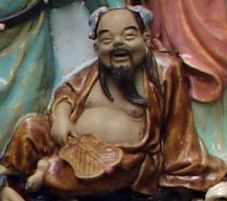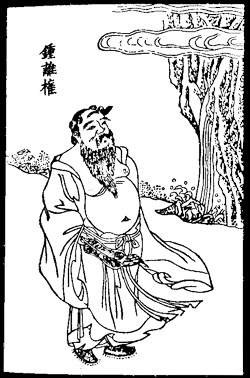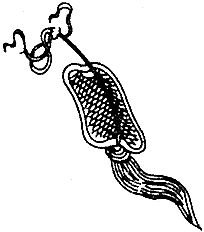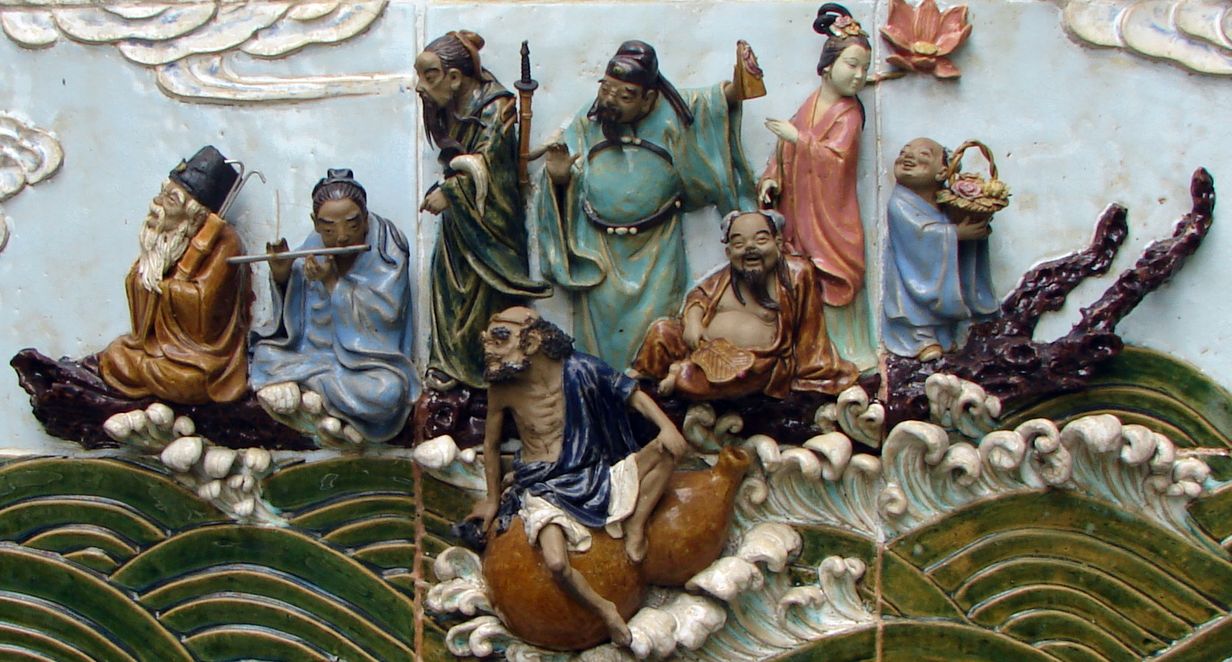
Content created: 2010-12-30
File last modified:
Go to previous or next story.

ZHŌNGLÍ Quán 钟离权 = a military officer with large breasts, an overbearing wife, and uncertain dynastic affiliation
ZHŌNGLÍ Jiǎn 钟离简 = His brother, keener to study the Way than to be beheaded
Old Man ZHŌNGLÍ = their father, probably a high marquis or general
LǏ of the Iron Crutch (LǏ Tiěguǎi 李铁拐) = a Daoist immortal (story 2)
Prior Master of the Eastern Radiance (Dōnghuá Xiānshēng 东华先生) = a hermit, possibly illusory, possibly simply elusive
LǙ Yán 吕岩 = a promising scholar saved from worldly success by Zhōnglí Quán (story 4)
Liú Hǎichán 刘海蟾 = another convert
Various soldiers, supernaturals, and a vanishing priest

Some people say that Zhōnglí Quán 钟离权 was a military officer in the Zhōu 周 Dynasty (period 4) who, having been defeated in battle, fled to Mount Zhōngnán 终南山, where he met hermits who instructed him in the Way.
Others say that he lived in the Hàn 汉 Dynasty (period 6). According to this account, Zōnglí Quán was born in Xiányáng Xiàn 咸阳现, in Shǎanxī 陕西 Province. His father had the title marquis (hóu 侯) and was an official in the city of Yúnzhōng 云中, which means “Amidst the Clouds.”
Following his father, Zhonglí Quán in his time also served as an official. In his old age, goes the tale, he fled his overbearing wife and became a hermit on Mount Yángjiǎo 羊角山, in Píngyáng District 平阳府, in Shānxī 山西 Province. Sometimes he referred to himself as “Cloud House” (Yúnfáng 云房), perhaps because of his youth “Amidst the Clouds.” At other times he called himself the “Philosopher of Harmony” (Héhé Zǐ 和合子), perhaps in contrast to his busy time as an official with a demanding wife (but alas confounding himself with the protagonist(s) of a different story).
Because of his fame in later generations, he was therefore sometimes called Hàn Zhōnglí 汉钟离, meaning Mr. Zhōnglí of the Hàn Dynasty, say some scholars.
Not so, claim other scholars. Hàn Zhōnglí is not the name of a person at all, they say, but of a region, although perhaps named after him. It was here, they say, that a Daoist priest and beggar named Zhōnglí made a pill of immortality and gave it to a very henpecked man named Lǎo Zhì 老志, who swallowed it. He immediately went quite mad, we are told, and then startled everyone by ascending into the sky happily singing, leaving his outraged wife screaming below.
Still other people say that, although the traditions about his venerable father and his official career may be reliable, Zhōnglí Quán 种离权 lived not in the Hàn but in the Táng 唐 dynasty (period 12).
Tradition tells us that when little Quán was born, he had startlingly large breasts, and no one knew what to make of such a baby. In fact, of course, this trait marks a baby as a person of great spiritual potential. As it happened, he was even an immortal, who, because of certain indiscretions in heaven, had been sent to earth as punishment, but with the destiny that, if he chose to study the Way, he could once again attain to his former status as an immortal.
Unfortunately, he did not know that.
When he grew up, Quán was fond of fighting and battles. Some people say that he had an older brother who was eaten by a tiger. Little Quán was so outraged that he trained in martial arts until he was able at the age of nine or ten to chase down the tiger and thrash it until at swore off human flesh forever.
In time, Quán became a great general, known for extraordinary bravery. (He was also known for his ever growing belly, for he liked food just as much as he liked battles.)
On a certain occasion during the long wars against the Tibetans, Zhōnglí Quán was surrounded by the enemy host, but through sheer, mad courage fought them to a standstill.
As this was going on, the immortal Lǐ of the Iron Crutch (whom we met in the second story) was looking down at the battle from the emptiness of the heavens, shaking his head sadly. Noting Zhōnglí Quán’s great bravery, he reflected that the brilliant Quán would be adulated for his military prowess, would go on to gain the title of marquis like his father before him, and would, like so many talented people, simply become a self-satisfied high official with an ever expanding belly, and would never get around to studying the Way.
It was a sad thing to contemplate such huge worldly success, and Lǐ of the Iron Crutch resolved that a catastrophe of that magnitude needed to be avoided.

So he descended into the camp of the defeated enemy commander in the guise of an old man and suggested that a night attack upon Zhōnglí Quán’s encampment might be surprisingly successful.
Meanwhile Zhōnglí Quán was not at all put off his guard by his great success in the battle he had just won. He warned his soldiers that the enemy was still powerful and commanded them to be alert throughout the night.
But none of them thought anything was odd about an old beggar who appeared near their camp, since beggars are pretty much everywhere when a land is at war. The beggar was in fact Lǐ of the Iron Crutch, who quietly slipped around to the supply tents on the far side of the encampment and set them afire just as the enemy soldiers attacked from all sides.
In the chaos that followed, all was lost. Zhonglí Quán fled on horseback with as many troops as could follow, but little by little they fell before enemy pursuit until he was alone. He wandered aimlessly, his dreams in ruins. He had failed to guard against fire. He had lost his army. With such a record, he never could face the emperor, or even his family.
As his horse limped slowly down unknown trails in the early dawn light, he met an odd foreign priest, who led him to a small hamlet and told him it was the home of the Prior Master of the Eastern Radiance (Dōnghuá Xiānshēng 东华先生), who practiced the Way in that place, and that he might ask for shelter there. And then priest disappeared back into the woods.
The Prior Master invited Zhōnglí Quán to be his guest. The Prior Master also urged him to study the Way and agreed to become his master (shīfù 师父). The master taught him the secrets of long life, and the method of the Sword of the Green Dragon (qīnglóng jiàn fǎ 青龙剑法). But the next day, at his master’s insistence, he reluctantly headed back home. When he looked back, the master and his hamlet had vanished as though they had been only a dream.
When he got home, Zhonglí Quán told his family all that had happened. And he told them that he had to flee before the imperial troops came to take him to the emperor for beheading. And he told them that he had decided to become a hermit and study the Way.
His brother ZHŌNGLÍ Jiǎn 钟离简 said that he too wanted to avoid imperial troops and beheading and to and study the Way. So the two men set forth into the mountains, where they built a little hut of rushes and practiced alchemy (xiūliàn 修练). In time they became masters of great ability.
One day they noticed a great crowd of people with wagonloads of worn and shabby household goods trudging past their rush hut. “We are leaving our home because of the great famine that has struck our land, for poor people like us have nothing to eat,” they told the two hermits. But for an accomplished master of the Way, this was a problem than could be solved. Using a mysterious method, Zhōnglí Quán took the few copper pennies and transformed them into silver, which he distributed among them so that they were not poor any more, and they could buy plenty of food despite the famine, for somehow people with enough silver can always buy food even when there isn’t any.

Another time, as he was engaged in meditation upon the Way, Zhōnglí Quán suddenly saw a stone wall in the forest break open, and inside was a small jade box. Inside the jade box was a secret formula. He took it home and followed it. In a few days he saw a colored cloud and heard celestial music, and a white crane came to him and said, “The Jade Emperor commands your presence in Heaven.”
So Zhōnglí Quán took leave of his brother (to whom he transmitted the secret formula), mounted the crane —some say the cloud— and floated into heaven to join his brother immortals. Not long afterward, his brother, Zhōnglí Jiǎn, joined him there. And this divine triumph was because Lǐ of the Iron Crutch had generously staged a timely intervention and ruined Zhōnglí Quán’s career of mere earthly glory.
A famous story about Zhōnglí Quán concerns his meeting with a once promising scholar named Lǚ Yán 吕岩, whose career he abruptly changed by means of a compelling dream that revealed the futility of everything except the Way. We will learn more about that in the next tale.
Lǚ Yán was not the only promising scholar lured away from public life by Zhōnglí Quán. Another of his encounters was with was a brilliant imperial official named LIÚ Hǎichán 刘海蟾, who abandoned the ordinary world to seek the Way, and who is always shown carrying a string of coins and a three-legged toad, but his story would take us far afield. If you want to know it anyway, click here.
In art, Zhōnglí Quán is shown as a fat man whose great belly and breasts often protrude from his gown. He carries a fan, and sometimes also (or instead) one or more of the peaches of immortality.

Return to top
Go to
previous or next story,